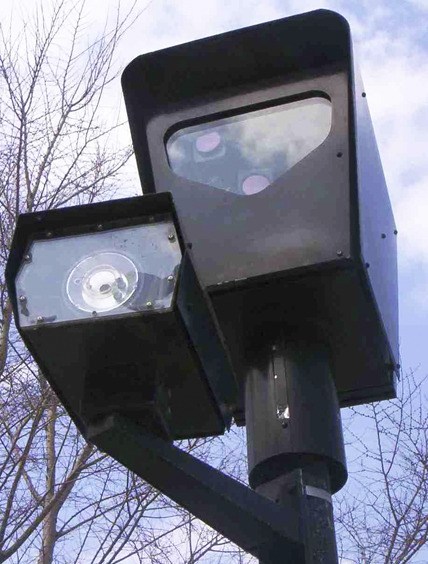Auburn’s Photosafe enforcement program is at a crossroads.
Every quarter, the Auburn Police Department reports that the number of traffic violations is down — drastically so — since the cameras first opened their eyes on drivers in July 2006.
That means, City officials say, that as motorists make their way through Auburn, they are paying close attention to avoid running afoul of lights at the three camera-placed intersections and easing up on the pedal within the six photo-enforced school zones.
The upshot is that revenues — read fines incurred and paid to the City — are down.
That the program is doing exactly what City officials said they had hoped it would do when former Police Chief Jim Kelly first suggested it — reducing the number of violations and lowering accident rates, especially from T-bone collisions — exposes the paradox built in to the business model of the vendor.
That is, for Redflex Traffic Systems of Scottsdale, Ariz., the more effective the Photosafe program, the fewer bucks it receives.
Company officials recently told City’s Finance Director Shelley Coleman that with the continued drop in revenue, it is barely covering its costs it incurs with the Auburn cameras.
Redflex charges the City a monthly fixed fee of $4,870 per camera location, although the figure varies with the number of citations the City receives.
According to figures compiled by Auburn Councilman Bill Peloza, the cost for the City to manage Photosafe in 2012 was $180,000.
With the City’s recent change from Auburn Municipal Court to King County District court, the county has taken over those collection duties, resulting in a $4,000-to-$5,000 per month drop in the City’s expenditures, Coleman said.
Auburn officials, in the interest of making its contract with Redflex cost-neutral, suggested Redflex sunset the current contract and enter into a new one, though with a less-than-five-year extension.
Redflex called that proposal “a non-starter.” Then it came back a $5,000-per-month credit to offset City costs, worth about $60,000 year.
Here’s how the credit works: should the City collect $45,000 in month in Photosafe revenues, it would get the first $5,000 and remit $40,000 to Redflex. Given Auburn’s 72,000 residents, that comes to $1.67 per resident.
Coleman said the credit would reduce the City’s annual expenditures from $180,000 to $120,000.
If the City Council doesn’t renew the contract, Coleman said, Redflex will have to write off the cumulative $600,000 balance. The City, assistant City Attorney Steven Gross noted, would not be on the hook for that sum.
“The City’s obligation is limited to the extent of gross receipts to the City for automated violations,” Gross said. “There is no obligation to the City over and above what we receive for automated violations, absolutely none.”
“It’s only to the extent that anything that comes in from Redflex tickets for the subsequent 12 months that it will go toward that outstanding balance,” Coleman said. “It’s not a liability. If we sunsetted and didn’t do an amendment and did a new contract, they would have to write that off in the 12 months. They don’t want to do that.”
The City had used the revenues received in excess of costs to install traffic calming devices.
Lewis said that even with a new contract, it is unlikely the program will ever be in the black again.
Officials decided to ask staff to seek a one-year extension of the contract with Redflex while the City sends requests for proposals from other vendors.


